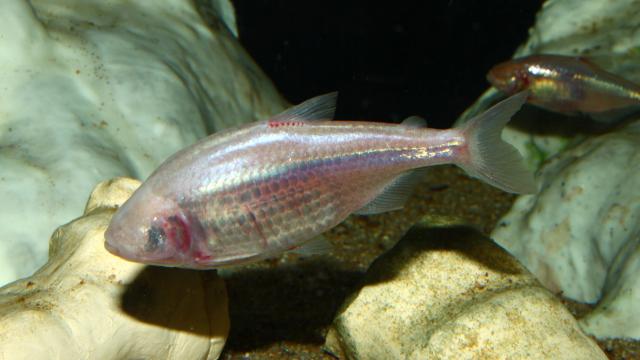You may consider your eyes a priceless commodity, but for Mexican cavefish, they were a burdensome expense. In a first-of-a-kind study, scientists have figured out exactly how much energy an animal saves by abandoning vision — in this case, anywhere from 5 to 15%.
Those figures, published yesterday in Science Advances, support the long-held notion that cavefish, like many creatures that dwell in permanent darkness, have gone blind to save energy. That sounds like a pretty intuitive find, but historically, the so-called “expensive tissue hypothesis” hasn’t been an easy thing for biologists to prove. To show that an animal saves resources by giving up an organ, you’d have to compare resource use in the animal’s modern and ancestral anatomical states. In most cases, this simply isn’t possible.
But the Mexican tetra Astyanax mexicanus turns out to be the perfect test subject, because surface-dwelling variants still have functional eyes. To figure out exactly how much those eyes “cost,” biologist Damian Moran and colleagues collected specimens with and without working vision. Next, they — look away, vegetarians — excised the fishes’ brains and eyeballs, and kept the organs alive in the lab by bathing them in artificial cerebrospinal fluid. The scientists calculated the energy cost of vision by measuring exactly how much less oxygen was required to keep the sightless fishes’ visual organs going.
“Our measurements in the Mexican cavefish show that the visual system requires between 5% and 15% of the animal’s total energy budget, depending on the age of the fish,” Moran said in a statement. “This is a tremendously high cost! Over evolution, this morph lost both eyes and visual cortex, without a doubt because of the unsustainable energy cost of maintaining a sensory system that no longer had any significance.”
The study is a fascinating reminder that even when something seems like “common knowledge,” it can be terribly difficult to prove scientifically. Often, it takes crazy, out-of-the-box thinking — like sticking brains and eyeballs in artificial spinal fluid — in order do so. But isn’t that why we love science?
[Read the full paper at Science Advances h/t Science News]
